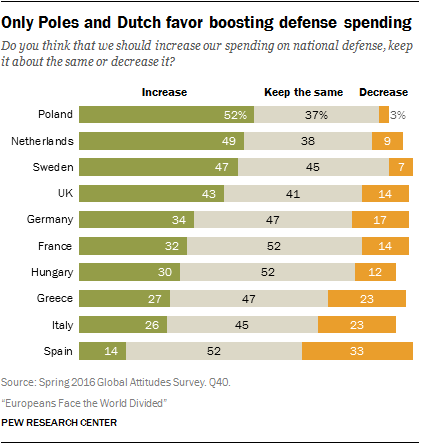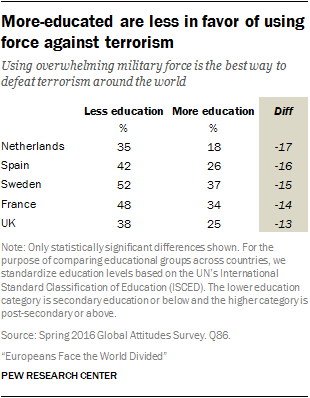Europeans overall appear reluctant to support the use of hard power in international affairs. There is little backing for boosting defense spending and, despite overwhelming concern about the threat posed by ISIS, many believe that relying too much on military force to defeat terrorism only creates hatred that can lead to more terrorism.

Median spending on defense is 1.2% of gross domestic product among the EU nations surveyed (the United States spends 3.3%). This outlay ranges from 0.8% in Hungary to 2.6% in Greece, but in 2015 such expenditures were down in eight of the 10 nations surveyed. Only in Poland (52%), which spends 2.2% of its GDP on the military, and the Netherlands (49%), which spends 1.2%, does roughly half the public support increasing outlays on national defense. Despite commitments by their governments to boost military spending, around half the public in France (52%) and Spain (52%) want to keep defense spending the same as it is today, as does a plurality in Germany and Greece (both 47%). A third of the public in Spain (33%) and about a quarter in Italy (23%) favors cutting military outlays.
 A reticence to exercise hard power can also be seen in the lack of public support for the use of overwhelming military force to defeat terrorism. Despite large majorities in each society who say that ISIS is a major threat to their country, half or more in six of the 10 EU nations surveyed say relying too much on military force to defeat terrorism creates hatred that leads to more terrorism. The Dutch (66%), Germans (64%) and Greeks (64%) in particular share a concern that a strong military response to terrorism will only worsen the problem. At the same time, roughly half of Poles (52%), Italians (52%) and Hungarians (51%) believe that using overwhelming military force is the best way to defeat terrorism. Swedes are divided on the issue.
A reticence to exercise hard power can also be seen in the lack of public support for the use of overwhelming military force to defeat terrorism. Despite large majorities in each society who say that ISIS is a major threat to their country, half or more in six of the 10 EU nations surveyed say relying too much on military force to defeat terrorism creates hatred that leads to more terrorism. The Dutch (66%), Germans (64%) and Greeks (64%) in particular share a concern that a strong military response to terrorism will only worsen the problem. At the same time, roughly half of Poles (52%), Italians (52%) and Hungarians (51%) believe that using overwhelming military force is the best way to defeat terrorism. Swedes are divided on the issue.
 As might be expected, there is a deep ideological divide on this issue. About half or more of people on the right of the ideological spectrum in Italy, Sweden, France and Spain support exercising overpowering military might. At same time, people on the left for the most part are far more concerned than those on the right that such use of force would spawn more terrorism.
As might be expected, there is a deep ideological divide on this issue. About half or more of people on the right of the ideological spectrum in Italy, Sweden, France and Spain support exercising overpowering military might. At same time, people on the left for the most part are far more concerned than those on the right that such use of force would spawn more terrorism.
Views on the efficacy of overwhelming force also differ along educational lines. Those with a secondary education or less are more likely than those with more than a secondary education to believe that the use of overwhelming force is the best way to defeat terrorism. This is particularly the case in the Netherlands, Spain, Sweden, France and the UK.


